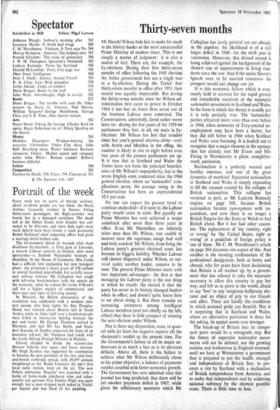Thirty-seven months
Mr Harold Wilson bids fair to make his mark- in the history books as the most unsticcessful Prune Minister of modern times. This is not simply a matter of judgment: it is also a matter of fact. There are, for example, the by-elections. During their first thirty-seven months of office following the 1945 election' the Attlee government lost not a single seat - in a by-election. During the Tories' first thirty-seven months in office after 1951 their record was equally impeccable. But during the thirty-seven months since the Wilson ad- ministration first came to power in October 1964 it has lost no fewer than seven out of the fourteen Labour seats contested. The Conservatives, admittedly, fared rather worse later on : during the five years of the 1959.64- parliament they lost, in all, six seats in by- elections. Mr Wilson has lost that number since last year's general election alone—and, with Acton and Meriden in the offing, the number is likely to rise to eight before even two years of the present parliament are up. It is true that in Scotland and Wales the Tories have not been the principal benefici- aries of Mr Wilson's unpopularity, but in the seven English seats contested since the 1966 general election, where no 'nationalist' com- plications arose; the average swing to the Conservatives has been an unprecedented 10.1 per cent.
No one can expect the present trend to continue unchecked—if it were to, the Labour party would cease to exist. But ;qually no Prime Minister has ever, achieved a major comeback after more than three years in office. Even Mr Macmillan, an infinitely wiser man than Mr Wilson, was unable to recover once the supermac. image had well and'truly cracked. Mr Wilsob, from being the ' Labour party's greatest electoral asset, has become its biggest liability. .Whether Labour will choose shipwreck under Wilson, or sur- vival under another leader, remains to be seen. The present Prime Minister starts with two important advantages : the first is that managing the Labour party is the one thing at which he excels; the second is that the party has never in its history changed leaders when in office, and doesn't quite know how to set about doing it. But there remains an increasing awareness among intelligent Labour members (and not chiefly on the left, either) that there is little prospect of winning the next election under Wilson.
Nor is there any disposition, even, to quar- rel with (at least the negative aspects of) the electorate's verdict at the present time. For the Government's failure .in all its major en- deavours is as much a fact as is its electoral debacle. Above all, there is the failure to achieve what Mr Wilson deliberately chose as his prime objective; a balance of payments ! surplus coupled with faster economic growth. The Government has now admitted what this journal has long predicted, that there will be yet another payments deficit in 1967; while given the reflationary measures which Mr Callaghan has justly pointed out are already in, the pipeline, the likelihood is of a still larger deficit in 1968—for the sixth year in succession. Moreover, this dismal record is being achieved against the background of the slowest rate of improvement in living stan- dards since the war. And if the entire Queen's Speech were to be enacted tomorrow the prospect would not change one jot.
It is this economic failure which is com- monly held to account for the rapid growth and remarkable successes of the separatist nationalist movements in Scotland and Wales. In the form in which this theory is usually put it is only partially true. The 'nationalist' parties attracted more votes than ever before in 1964, when memories of Tory-created un- employment may have been a factor; but they did still better in 1966 when Scotland and Wales were booming. It is foolish not to recognise that a major element in the upsurge that has already sent Mr Evans and Mrs Ewing to Westminster is plain, straightfor- ward, patriotism.
Nationalism is a perfectly normal and healthy emotion, and one of the great dynamics of mankind. Separatist nationalism in Scotland and Wales is simply expanding It) fill the vacuum created by the collapse of British nationalism. This collapse has occurred in part, as Mr Ludovic Kennedy implies on page 568, because British nationalism became synonymous with im- perialism, and now there is no longer a British Empire for the Scots or Welsh to feel British about. But it has had other causes, too. The replacement of 'my country, right Or wrong' -by 'the United States, right or wrong' as a guideline of foreign policy is one of them: Mr C. M. Woodhouse's article on page 564 discusses one aspect of this. And another is the seeming confirmation of the professional denigrators, both at home and abroad, who for years have been declaiming that Britain is all washed up, by a govern- ment that has refused to take the measures necessary to allow this country to pay her way, and left us in pawn to the world, afraid to say 'boo' to any twopenny-halfpenny dic- tator and an object of pity to our friends and allies. These are hardly the conditions in which national pride can flourish. Nor is it surprising that in Scotland and Wales, where an alternative patriotism is there for the asking, its appeal seems ever stronger.
The break-up of Britain into its compo- nent parts would be a retrograde step. But the forces of separatist nationalist move- ments will not be defused, nor the growing malaise and lawlessness in England reversed, until we have at Westminster a government that is prepared to put the health, strength and independence of Britain first; to pre- empt a tnat by Scotland with a declaration of British independence from America, and to make that independenCe real by achieving national solvency by the shortest possible route. There is little time to lose.






































 Previous page
Previous page